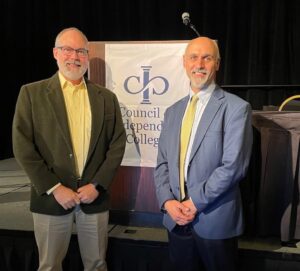In mid-May a capstone meeting of the GLCA Opening Doors of Dialogue program engaged representatives from 10 Midwestern colleges and their host communities to share experiences and thinking about community-campus relationships and the potential for strengthening bonds through collaboration. The Opening Doors of Dialogue was funded by a grant from the Mellon Foundation to the GLCA.
Through a lively set of exchanges, one community-campus team would “interview” another team, working from written accounts of community-campus roundtables carried out through the fall and winter of 2021-22.
The meeting’s discussions centered on a core question: What is the case for community-campus partnerships in the twenty-first century? The answers yielded expressions of reciprocal benefits collaboration can offer. If there is a basis of trust and mutual commitment, both campus and community can inspire one another to discuss what is possible to achieve and act on ideas that are enhanced by working together. In some instances, the liberal arts college can bring expertise to the community. No less important, though, the community offers lived experience and practical approaches to address challenges and enrich the learning college students can gain from the curriculum.
In both cases, working with others who do not necessarily share the same background or experiences can provide fruitful, productive, and meaningful partnerships. Employers today voice growing calls for college graduates who possess skills and understanding beyond academic knowledge. Experiential learning, from engaging with and contributing to the community, can offer solidified grounding for student learning and application.
Some Core Recommendations
The dialogues of this three-day meeting addressed a range of topics. From a list of key takeaways written on flip charts the final morning, a few points attracted significant endorsement, as expressed through a “dot voting” process.
- Build the relationships among people who will engage in a community-campus partnership. All successful collaborations stem from a foundation of trust which must be established at the front end of planning. Collaboration cannot succeed without first establishing strong bonds among the primary stakeholders as people who share the vision and can be trusted to support one another in pursuing the goals. Build the relationships to ensure success, strength, and longevity.
- Create systems that will allow a collaborative project to make progress toward its goals, even as changes occur in the project’s setting and participants. It often happens that the founders of a campus-community partnership achieve their initial visions and move on to other things. Sustaining action toward a longer-term success requires that a program have a structure in place to engage others who can carry the progress forward. College students may offer important contributions, but they likely move on at graduation or the end of a semester. Community partners and stakeholders cannot be left in the lurch from such transitions.
- Make reciprocity a core principle of campus-community collaboration. Leaders of a collaborative project must act to ensure that the benefit of their work accrues equitably to both parties. A pointed question from one community-campus round table had asked, “So, the students earn credit and graduate. What’s in it for the community?” Campus leaders and college-educated students must be certain that a collaboration delivers value to members of the community as well as to themselves. A college that wins a grant from a foundation to fund actions and people of a project must be certain that community partners who contribute to this work are recognized and compensated in comparable ways. Leaders should strive to build a team that is not just diverse but inclusive and equitable – regardless of education, culture, race, or economic status. Avoid the condescending attitude that community members should feel flattered simply to be invited to the college’s project. Two heavily endorsed takeaways from the final meeting segment made these points:
- Colleges must affirm the value of faculty achievements in community-engaged learning and research, and they must fulfill this commitment through policy statements and actions that declare this work “counts” in the assessment of faculty for purposes of tenure and promotion. Statements expressing the importance of community-campus engagement can be found in publicity materials of virtually every college and university in the U.S. There are differences, however, in the value that higher education institutions accord to community engagement. Sometimes the imbalance contributes to different experiences for individual faculty members in terms of their career advancement. One of the strongest takeaways from this capstone meeting was that college leadership needs to make a structural decision (involving dollars, policy, tenure & promotion) concerning the value of community-engaged learning.
Steps Forward from the Roundtables
Another component of this program invites community-campus settings which had earlier hosted Opening Doors roundtables to apply for grant funding of up to $8,000. The purpose of such a grant is to continue the dialogues or try a small pilot project as a test of concept to strengthen collaboration. Ideally, some of these extended actions can yield a larger implementation proposal to a major foundation, which would help community and campus stakeholders to build stronger bonds and enhance the quality of life and learning in their setting.
Visit GLCA Opening Doors of Dialogue Program for more information.


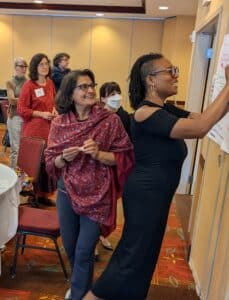




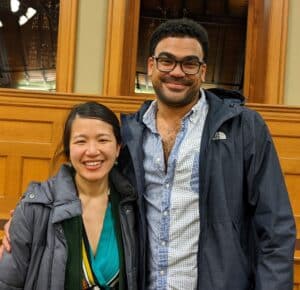
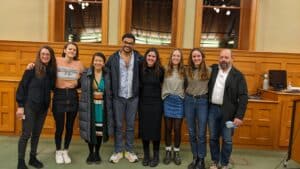

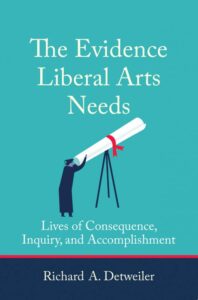 By its very nature as small residential learning communities, liberal arts colleges are in positions to maximize the likelihood of significant mentorship between a student and faculty member. They are also settings likely to support student interests in exploring across academic disciplines to reap the benefits of reading and thinking widely in the course of their learning.
By its very nature as small residential learning communities, liberal arts colleges are in positions to maximize the likelihood of significant mentorship between a student and faculty member. They are also settings likely to support student interests in exploring across academic disciplines to reap the benefits of reading and thinking widely in the course of their learning. 